How to Stop Dog Barking: Tips and Tricks for a Peaceful Home
Are you ready to learn how to stop dog barking once and for all?
Is your dog's barking driving you crazy?
Excessive barking can be a nuisance for both you and your neighbors. But don't worry, there are ways to stop your dog from barking uncontrollably.
Coton de Tulear dog barking

Because the Coton de Tulear is instinctively a guard dog, he is just naturally doing his job when he barks to let you know someone or something is "out of the ordinary". This is actually a good thing. I like that Luc barked when someone was at the door or when a strange car pulled in the driveway. I taught him the “quiet" command and he would stop barking (mostly).
In the beginning before he was trained, he would continue to bark excessively to the point where he and I and the visitor would get anxious. I couldn't even hold a conversation with my visitors over the barking, and nothing seemed to calm him.
At first, in trying to calm and soothe Luc, I did the wrong thing altogether. When I talked soothingly and pet him he thought he was being rewarded for his protection and barking. So I had to switch tactics. I had to show Luc that I was in charge and that I didn't need his protection. And I had to stop reacting when he barked for attention. This was so hard, but I tried not to comfort, yell, say NO, or anything that would give him the attention he was looking for.
The first step in learning how to stop dog barking is to understand why they’re barking in the first place. Cotons de Tulear can be vocal dogs, and they bark to communicate with their owners.
Reasons why your dog may bark:

- Attention-seeking: Your dog has been left alone too long and desperately seeks any attention from you. Dogs who are bored and need stimulation, toys, exercise, or your attention fall into this category. This is especially true if they are bored or want to play with you.
- Fear or anxiety: They bark if they’re afraid or anxious. This is common during thunderstorms or when they're left alone.
- Territorial behavior: When they bark to protect their territory. This is common if they see someone or something unfamiliar in their space. For example, your dog will give a warning bark if someone’s at the door. This was the most common reason for Luc’s barking.
- Playful barking: It’s best not to encourage any play that stimulates your dog to bark.
- Health issues: Notice if your dog is in pain or discomfort. If you notice any changes in behavior, it is best to consult your veterinarian.
It is essential to identify the reason why your dog is barking excessively and address it accordingly. With proper training and attention, you can help your dog relax.

Problems Caused by Excessive Barking
I don’t have to tell you that excessive barking can be a nuisance, not only for you but also for your neighbors. It can lead to strained relationships and even legal action.
Here are some of the problems caused by excessive barking:
- Disturbing the peace: Excessive barking can disturb the peace and quiet of your neighborhood. It can cause stress and anxiety to your neighbors, especially if they work night shifts or have young children.
- Health problems: Constant barking can lead to health problems in dogs, such as sore throats, exhaustion, and dehydration. It can also lead to behavioral issues such as aggression, destructiveness, and anxiety.
- Legal action: If your neighbors make a complaint about your dog's barking, you could face legal action. In some cases, you may be required to pay a fine or even surrender your dog.
- Strained relationships: Excessive barking can lead to strained relationships with your neighbors. It can cause resentment and even lead to harassment and bullying.
How to Stop Dog Barking - Specific Strategies
- Teach the “quiet” command. Let your dog bark once or twice and then use
this command to let him know to stop barking. Reward him when he stops
barking.
- Some dogs bark if they are left on their own too long and get
bored. Spend lots of time and attention on your new puppy. Provide
plenty of toys, walks, and quality time spent with you and your family.
A bored dog will bark much more than a dog who is active and happy. And puppies need much more mental and physical stimulation than you think.
- Socialize
your dog at an early age to ensure he gets used to a wide variety of
situations as he gets older. Take him to places where he’ll be exposed
to kids, adults, cars, all kinds of noises, and other animals.
- If barking is a problem when you aren't home (and you want to
keep your neighbors happy) keep him in his crate with some white noise
like a ceiling fan, fountain, or radio to drown out the noises that
might set him off. Also leave him with toys that will keep him
stimulated while you're away.
- If nothing you try seems to work, hire a dog trainer. The extra time and money can save you years of frustration.
- If your dog has a severe case of barking and none of these solutions are working, you should see your veterinarian and make sure there are no physiological issues.
- Utilize behavior modification techniques such as positive reinforcement, desensitization, and distraction..
- Don't forget to reward your dog for good behavior - treats, hugs, praise, and toys help to let your Coton know they're making good choices.
- Get Help! If your dog is still barking inappropriately after incorporating the above tips, it’s time to seek more help. Check out Brain Training for Dogs. They’ve got a proven track record for helping dogs overcome problem behaviors such as barking.
Preventing Future Barking Issues
To prevent future barking issues, you need to address the root cause of your dog's barking behavior. Here are some tips to help you prevent future barking issues:
- Provide Adequate Exercise to keep them healthy both physically and mentally. A tired dog is less likely to bark excessively. It’s a good idea to include exercise as part of your dog’s daily routine.
- Socializing Your Dog with other dogs and people can help reduce separation anxiety and barking. It will also help your dog become more confident and less anxious.
- Training Your Dog to obey basic commands such as "sit," "stay," and "quiet" can help reduce barking. Positive reinforcement training methods work best.
- Use Positive Reinforcement. Whenever your dog behaves well and doesn't bark, reward them with treats, a favorite chew toy, or praise. This will encourage them to repeat the behavior.
- Avoid Punishing Your Dog for barking because it can make the problem worse. It can also damage your relationship with your dog. Instead, try to understand why your dog is barking and address the underlying problem.
- Provide Mental Stimulation. Boredom can lead to excessive barking. Mental exercise is just as important as physical exercise. Provide your dog with plenty of interactive toys and puzzles to keep them mentally stimulated. Daily fun training sessions can also provide mental stimulation.
- Calming music or white noise are effective tools to help soothe your dog’s anxiety.
By following these tips, you can prevent future barking issues and enjoy a peaceful life with your furry friend.
What you should never do to stop your barking dog

- Punishing your dog is not an effective way to stop dog barking and it can actually make the problem worse. Dogs don’t understand punishment the same way humans do.
- Using punishment devices such as shock collars, anti-bark collars, or ultrasonic devices can be harmful to dogs, especially small, sensitive dogs like the Coton de Tulear. These devices can cause physical pain and emotional distress, and they do not address the underlying issue behind your dog's barking. Instead of using these devices, try to train your dog using positive reinforcement techniques. My advice - if you find yourself doubting the safety of a product or training technique, chances are it's not all that safe. Trust your gut instincts and lean towards caution. It's better to be safe than sorry, right?
- Avoid loud noise deterrents. Back in the day, when Luc was just a puppy, a dog trainer told me that whenever Luc started barking incessantly, I should shake a can full of coins near his face. That noisy surprise would instantly stop him in his tracks and shut down the barking. But, while it seemed like a quick fix, it turned out that solving one dog behavior problem could actually create a brand new problem. The last thing you want is to make your dog more anxious, right? Your main goal is to have a happy and relaxed pup, not a nervous wreck.
- Yelling at your barking dog is counterproductive. It can increase their anxiety and make them more likely to bark. Instead, try to remain calm and use a firm but gentle voice to communicate with your dog. Then use one of the recommended methods above.
- Ignoring your dog’s barking can make him feel neglected and make him bark even more to get attention. It always comes down to addressing the issue behind the barking. Is he bored, hurt, feeling territorial, or afraid?
Remember, training your Coton de Tulear to stop barking will take time and patience. Be consistent with your training and reward good behavior, and you will see results over time.
You can learn how to stop dog barking with just a little time and patience. Barking is a very common problem with many dogs, including the Coton. Learn tips on how to stop barking that our visitors recommend.
Learn Dog Behavior Problem Solvers
Dog Barking Solutions from the World's Best Trainers
Return to Dog Behavior Modification
Home | About Me | Contact Me | Privacy Policy |Disclosure
Copyright© 2008- All Rights Reserved








